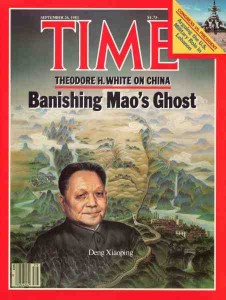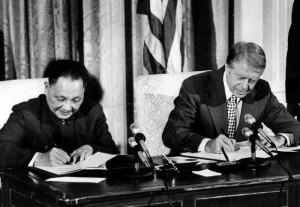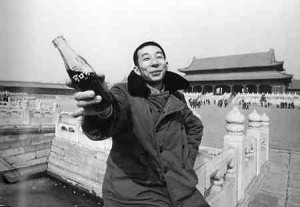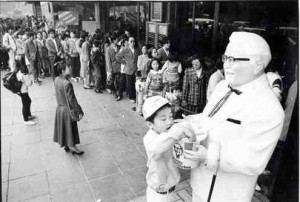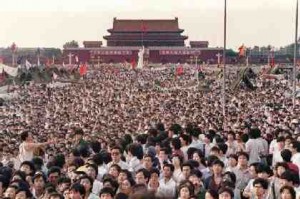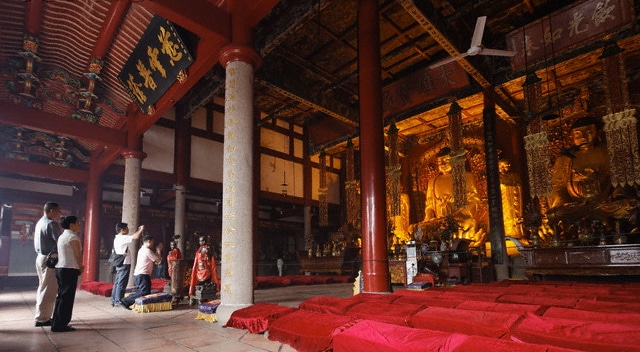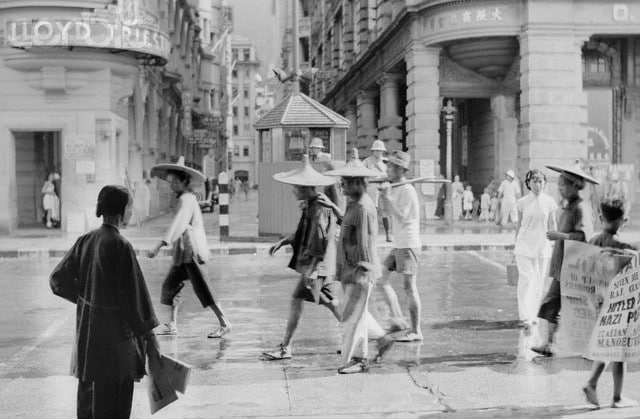After Mao dies, Deng reemerges from exile and becomes China’s new (informal) leader after a tough power struggle. The country is ready to move on. The new post-Mao government uses the face-saving formula that Mao had been “70% right, 30% wrong” (exceedingly generous if you ask me).
“Socialism with Chinese Characteristics”
Much more of a pragmatist than the ideological Mao, Deng was China’s father of economic reform. Recognizing that poverty and lack of incentive for self-improvement were fatal constraints, he impressively transformed China’s economy through innovative combinations of communism and capitalism.
Among his most famous quotes: “It doesn’t matter if a cat is black or white, so long as it catches mice,” and “It is glorious to grow rich”.
Over the last three decades, the speed and scale of modernization of his socialist market economy have been overwhelming. Yet, as the Tiananmen Square uprising showed in 1989, there were limits to the Deng Reforms—democratization, in the western sense anyway, wasn’t in the cards (indeed, never had been).
1978: Start of Deng’s Four Modernizations program (agriculture, industry, defense and science). Coca-Cola is admitted into the Chinese market.
1979: Touting China’s new “Open Door” policy, Deng tours the US. Deng is named Time Magazine’s “Man of the Year” (winning the honor again in 1985).
1980: The One Child Policy is rolled out nationwide as the population reaches 900 million.
1980: Shenzhen—next to Hong Kong—becomes the first of China’s “Special Economic Zones” (SEZ) to attract foreign investment. Hong Kong companies are the first to set up factories. In a matter of years, the small rice village is transformed—replaced with skyscrapers and new railway and airport to link it with rest of China. (2010 population: 9 million).
Shenzhen’s success catalyzes the rest of China. In the mid- to late-1980s, China opens more than two-dozen additional coastal cities as SEZs, where Korean, Japanese and Western companies build and manage factories.
1983: China’s new openness and liberalization leads to the rise of organized crime—gangs return to cities. As part of the campaign against “spiritual pollution,” thousands are arrested and executed during an anti-crime drive.
1984: China launches its first communications satellite into space.
1987: Western-style fast food hits China– KFC opens its first stores. McDonald’s will follow in 1991 (I know, it sounds lame….until you go there and find yourself eating it daily).
1989: China’s first stock markets open in Shenzhen and Shanghai.
1989: The Dalai Lama is awarded The Nobel Peace Prize, evoking international sympathy (similar persecution of Muslims in Xinjiang continues to receive less publicity).
But despite overall economic progress, many are unhappy with the speed and direction of change. As China grows more open and liberal, people become less shy about making their voices heard (for political reform, against corruption & wealth disparities, etc). As early as 1978, Deng was quoted as saying, “The masses should be allowed to vent their grievances.”
In 1989, reformer Bao Tong asks: “How is it that the workers and peasants who are named in the Constitution as ‘the basis of the country’ have nothing left to depend on — turned into a voiceless group of colonized weaklings, who are routinely bullied and humiliated by those with power and money?”
1989 Tiananmen Square Uprising
A memorial Service for Hu Yaobang — a liberal CCP general-secretary who was popular among students — grows into mass demonstrations at Tiananmen Square.
Although the western media mostly portrayed the incident as clamors for democracy (which was partially true), it mainly started out as students angry over poor job opportunities.
Deng’s reforms had largely disadvantaged the educated class. One popular slogan during the mid-1980s was that, “Those who hold scalpels earn less than those who hold eel knives.” Other gripes were part of the mix—ranging from mandatory calisthenics to crappy cafeteria food to wanting campus leaders chosen by open elections.
Soon, crowds of non-student Beijingers (angry at corruption, rich getting richer, etc) enthusiastically join in. The crowd swells, spilling over nearby streets. After seven weeks of government inaction, the crowd has mushroomed to an estimated 2-3 million.
June 4, 1989: The sh*t hits the fan. PLA tanks and soldiers empty the streets and fire on demonstrators (almost all those killed were not actually in Tiananmen Square but on the nearby streets). The death toll estimates vary widely, however most killed were non-student civilians, somewhere in the range of several hundred to a few thousand.
The incident is today referred to by Chinese as “six-four” (for June 4).
The Nineties
1990: China’s biggest SEZ launches in the suburbs of Shanghai at Pudong, designated to be China’s new financial and commercial hub (2010 population: 1.7 million).
1993: Former Shanghai mayor Jiang Zemin becomes the President of the PRC. During the 1990s, he accelerates economic reform and growth by privatizing state enterprises.
1994: Construction begins on the Three Gorges Dam.
1995-6: Taiwan Strait Crisis. In the run-up to Taiwan’s 1996 presidential election, China launches a series of live-ammunition “missile tests” off the coast of Taiwan. The elections are Taiwan’s first-ever free elections after decades of one-party KMT rule. US President Clinton cools things down by sending two aircraft carrier battle groups to the area.
February 19, 1997: Deng Xiaoping dies at the age of 92.

